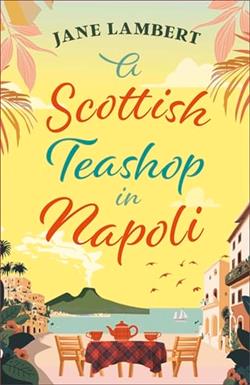Martial Peak Reviews
Jane Lambert’s A Scottish Teashop in Napoli is a heartwarming tale that beautifully intertwines themes of loss, resilience, and the unexpected bonds that form between people from different walks of life. Set against the vibrant backdrop of Naples, this novel offers readers a delightful escape into a world where the aroma of freshly brewed tea mingles with the rich scent of mozzarella, creating a sensory experience that is both comforting and invigorating.
The story begins with Lucy, a character whose life takes an unexpected turn when she is stood up at the altar by her childhood sweetheart. This moment of heartbreak is compounded by the cruel delivery of a drunken voicemail, leaving Lucy adrift and questioning her dreams of a future filled with love and family. Lambert skillfully captures Lucy’s emotional turmoil, painting a vivid picture of a woman who is forced to confront the fragility of her dreams and the uncertainty of her future.
In contrast, we meet Elena, a recently widowed woman grappling with her own set of challenges. Her husband’s death has left her with the daunting task of managing a centuries-old mozzarella factory, a family legacy that is teetering on the brink of collapse. At the same time, she is juggling the responsibilities of running a language school and raising her son. Elena’s character is a testament to resilience and determination, embodying the strength of a woman who refuses to let her circumstances define her.
Lambert’s portrayal of these two women is both nuanced and empathetic. Through their individual struggles, she explores the universal themes of loss and the search for identity. Lucy and Elena’s paths cross when Elena advertises a job in a desperate bid to save her businesses. This chance encounter sets the stage for a transformative journey that sees both women finding solace and strength in each other’s company.
The novel’s setting in Naples adds a rich layer of cultural texture to the narrative. Lambert’s descriptions of the city are vivid and evocative, capturing the essence of its bustling streets, vibrant markets, and the warmth of its people. The juxtaposition of Lucy’s Scottish roots with the Italian setting creates an intriguing dynamic, highlighting the contrasts and similarities between the two cultures. This cultural interplay is further enriched by the presence of the teashop, a symbol of Lucy’s heritage and a beacon of hope for both women.
One of the novel’s strengths lies in its exploration of the healing power of friendship. As Lucy and Elena work together to revive the struggling businesses, they also help each other heal from their respective losses. Their friendship is depicted with authenticity and depth, showcasing the importance of human connection in overcoming adversity. Lambert’s writing is imbued with warmth and humor, making the reader root for these characters as they navigate the complexities of their new reality.
In terms of character development, Lambert excels in crafting multidimensional characters who are relatable and compelling. Lucy’s journey from heartbreak to self-discovery is portrayed with sensitivity and insight. Her evolution is gradual and believable, as she learns to let go of her past and embrace the possibilities of the present. Similarly, Elena’s character arc is marked by growth and resilience, as she finds the courage to honor her husband’s legacy while forging her own path.
The novel’s pacing is well-balanced, with Lambert skillfully weaving together the personal and professional challenges faced by the protagonists. The narrative is punctuated by moments of tension and triumph, keeping the reader engaged and invested in the outcome. The resolution is satisfying and uplifting, offering a message of hope and renewal that resonates long after the final page is turned.
Comparatively, A Scottish Teashop in Napoli shares thematic similarities with works by authors such as Jojo Moyes and Jenny Colgan, who also explore themes of love, loss, and the transformative power of friendship. However, Lambert’s novel stands out for its unique cultural fusion and the depth of its character portrayals. The novel’s emphasis on the importance of heritage and the ways in which it shapes our identities adds an additional layer of richness to the story.
In conclusion, Jane Lambert’s A Scottish Teashop in Napoli is a beautifully crafted novel that offers a poignant exploration of loss, resilience, and the healing power of friendship. With its vivid setting, well-drawn characters, and engaging narrative, it is a story that will resonate with readers who appreciate tales of personal growth and the enduring bonds that connect us. Whether you are a fan of contemporary women’s fiction or simply looking for a heartwarming read, this novel is sure to leave a lasting impression.
























Reviews 0
Post a Reviews: